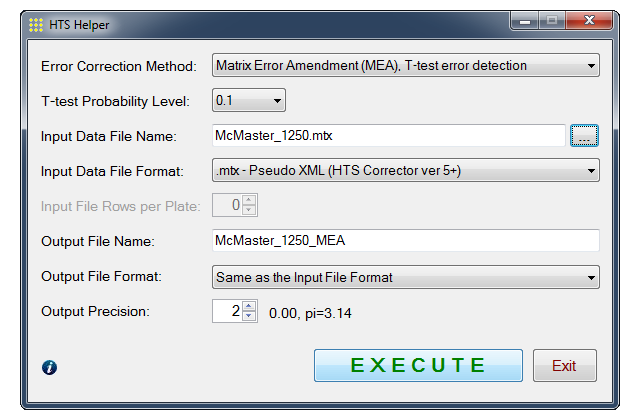|
||
HTSHelper Utility This page presents a handy freeware utility that can be used to process high-throughput screening data. This page presents a handy freeware utility that can be used to process high-throughput screening data.High-throughput screening (HTS) is a large-scale, greatly automated early step in drug development during which thousands of chemical compounds are screened and their activity levels measured in order to identify potential drug candidates (i.e. hits). Many technical, environmental and procedural factors can cause systematic measurement error or inequalities in the conditions in which the measurements are taken. Systematic error introduces inaccuracy in the data by over- or underestimating compounds' true activity levels and thus it has the potential to critically disturb the hit selection process. The systematic error is almost always location related. Usually, it affects compounds located in the same row or column on the screening plate and it may affect only a single plate or a sequence of plates in the HTS assay. It is of high importance to eliminate the effect of the systematic error on the HTS data before the hit selection process in order to ensure high quality results. The HTSHelper utility has been created to facilitate the systematic error correction of experimental HTS data. It implements several error correction and normalization methods:
For more general information about high-throughput screening please read Wikipedia's page on the topic.
Z-score and B-score are two widely used normalization methods designed to compensate for plate-to-plate differences, ensuring comparability of all measurements throughout the assay. Well Correction is a systematic error correction method designed to eliminate error that affects compounds located at the same well location (row and column) within the plates across the assay. Most of the error correction and normalization methods have one serious drawback - if they are applied on data that is not affected by any systematic error, they may alter unnecessarily the data causing effect similiar to the effect of the systematic error itself and thus impeding the hit selection process. Matrix Error Amendment (MEA) and Partial Mean Polish (PMP) are two novel methods designed to modify only those rows and columns in each plate that are affected by systematic error while preserving their comparability with the remaining unmodified measurements. In order to determine the location of the systematic error HTSHelper uses methodology developed earlier by its author and based on the well-known T-test used in statistics.
For more information, please, check our references page. |
||
| HTSHelper, last updated: March 23, 2012 by Plamen Dragiev |

